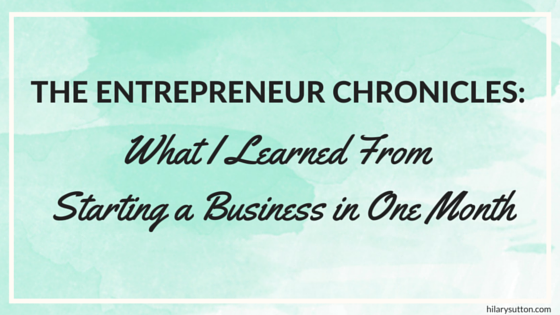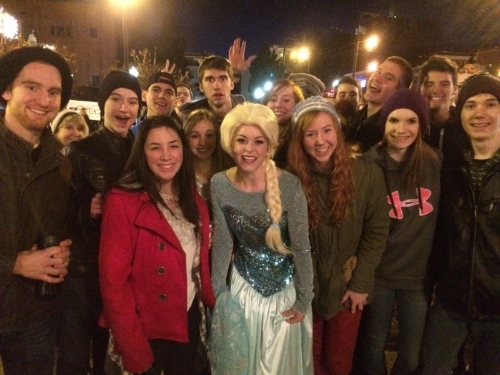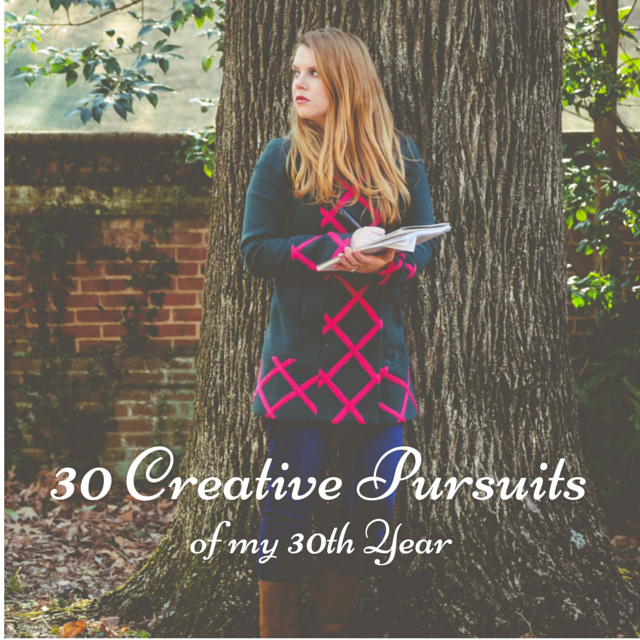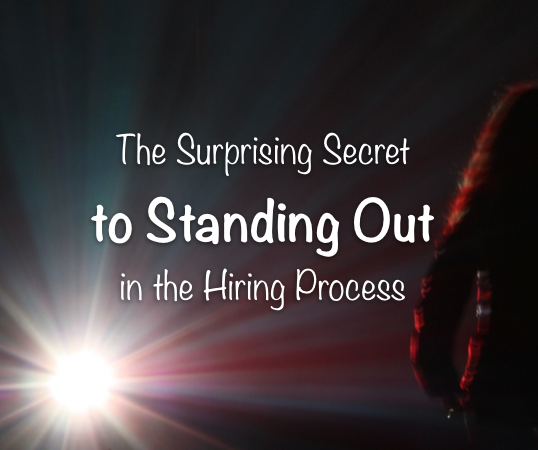Conversation with a Creative: Meet Creativity Expert & Facebook Product Designer Tanner Christensen
/I'm a writer, yes, but I'm coming up short on words to communicate how utterly stoked I am to speak with today's Conversation with a Creative guest. Tanner Christensen is a product designer at Facebook, author of the Creative Challenge, founder of Creative Something, developer of some of the top creativity apps, blogger on Medium, contributing author for Inc., and a former writer for Adobe's 99u.
Back when I was in grad school and began really diving into the study of creativity I found Tanner on Twitter and eventually discovered his incredible blog Creative Something. Tanner was creating inspiring, thought-provoking stuff centered on creativity. And he was doing it with a fresh perspective and approach that didn't feel stuffy or overly academic. He's done a lot in a short amount of time and he’s also a major dabbler--but we’ll get to that.
I think you’ll find Tanner’s perspective on creativity, Facebook, and the digital landscape fascinating. Without further ado: meet Tanner Christensen.
HS: What does creativity mean to you?
TC: Creativity is the mental capacity to generate novel and useful ideas.
HS: What piqued your interest in creativity? How did you come to study it and research it?
Creativity is this really alluring thing just on its own, isn’t it? Even if you don’t understand what it means to be creative or how it works, the notion that anyone, anywhere, can generate unique ideas from seemingly nowhere is a real type of magic that you can see and touch and be a part of.
It first captured my attention when I was very young. My friend’s father at the time ran a successful graphic design business and whenever I visited that office, full of colorful prints and futuristic gizmos, I always felt some type of magic in the work they were doing there. That’s what inspired me to pursue a career in design.
For some years I worked as a freelance visual designer, eventually landing a job at a real design agency, and everyone there kept talking about creativity but could never explain what it was they were talking about. I found that strangely captivating.
I decided to start pursuing the answer for myself; what is creativity and exactly how does it work? What makes novel thinking so powerful? If we could learn more about it what possibilities might we unlock?
HS: So you’re a product designer/creative strategist. Can you tell me about what you do and how the two intersect?
TC: My first job at that design agency wasn’t actually in design. I was hired to do online marketing — which I didn’t know how to do. I spent a lot of time having to teach myself about search engine optimization, computer science, and all that.
So while I was learning about these strategic, mostly analytical practices, I was also spending a lot of time on the side researching and writing about creativity.
After about three or four years I started to develop a really comprehensive understanding of creativity. What I learned was that what I — like many others — had been led to believe about creativity simply wasn’t true. It isn’t about art or design, writing or music, creativity is fundamentally about ideas and how we develop, understand, and communicate them. Not just in terms of the arts, but in every realm of thinking and work.
I was able to take this perspective and apply it to my work, to the point where I’ve done everything from leading creative teams of designers and engineers, to creating hit apps, and writing on this fairly renown blog called Creative Something.
Most recently I landed at Facebook where I work as a product designer and am able to do a lot of other fun things with my knowledge of creativity.
HS: We’re all on Facebook. But you work there. How is creativity woven into the Facebook culture?
TC: Some of the most remarkably talented and highly intelligent people I have ever met work at Facebook. When I first joined the company I was amazed to discover that one of the cognitive neuroscientists I had looked up to over the past decade, Paul King, worked there too.
It’s the kind of environment that makes you really appreciate the bridge between logical thinking and creativity.
The problems we solve at Facebook are really difficult, even at the smallest scale. What seems like a straight-forward challenge to outsiders — creating an experience that connects people all across the world — is actually highly complex. You have to figure things out like how a design pattern will scale for a hundred different screen sizes in a hundred different languages, some of which change direction or break the layout of a product.
What’s culturally acceptable and understood in one part of the world is abnormal or shunned in another. How do you create something as simple as a button when it’s not going to be looked at or understood the same way for any two people? Getting that right is really important when it comes to connecting the world.
At Facebook we rely not only on data and formal logic to solve problems or to empower people, we have to think creatively too. Because nobody else is designing at the scale we are. Nobody has ever really had to think about the things we’re creating at the scale we’re creating them.
The culture of the company is really about how to bring highly intelligent and overly creative people together — both groups highly ambitious — in order to achieve the same goals. I’ve written a little more about how Facebook achieves this here.
HS: Did anything surprise you about Facebook once you began working there that you didn’t anticipate prior to joining their team?
TC: Everything about working at Facebook has been a surprise. Even now, a few years into the job, I stumble on things that surprise me.
For one, the utter intellect and talents of those I work alongside is awe-inspiring. It’s really hard to put into words just how smart some people can be. I thought I had some idea of intellect but when you work alongside people who are programming machines to do things humans can barely do that’s really humbling.
Another thing is just how complex the work is being done at Facebook. It can sometimes be easy to look at the website or app and think that the goal of Facebook is something it’s not or that our priorities are misaligned, but the reality is so far from that. There are a lot of people doing a lot of really difficult work to help connect and empower people around the world, and it takes a lot to make it happen in such an effective way.
HS: You recently had a book published. Congrats! Can you tell us what “The Creativity Challenge” is about and what inspired you to write it?
One day in 2015 I got a call from Adams Media, my publisher, they had been reading my blog and were interested in seeing if I wanted to write a book.
Together we came up with the idea of The Creativity Challenge in an effort to create a small book that could empower anyone who flipped through the pages to think creatively.
The book is filled with 150 activities that I was able to piece together through my years of researching and writing on creativity. Some are fun and quirky while others are fairly straight-forward. The point of the book wasn’t to radically alter how people think about creativity, it was more of a way to provide an easy-to-reference guide for shaking up your routine and dusting off mental cobwebs.
HS: What are your creative habits? What do you do to sharpen your creativity?
TC: I dabble. If I wasn’t a designer I’d be a dabbler. The absolute best way to remain creative is to have many diverse hobbies, and so that’s what I’ve tried to do.
If you want to quickly energize your creativity, find something interesting in the world and learn how to do it yourself. Twitter, YouTube, and Quora are great ways to do this by the way.
For example, right now I am in the middle of: writing a second book, learning Arduino in order to make an tangible product, picking up tools for fine metal jewelry making, coding my seventh app, writing for Inc.com, getting into videography, leading public design critiques for Facebook, painting, ceramics, cooking, world travel, and probably a dozen other things I’m failing to recall.
All of these things do wonders for helping me think about solving problems and working in different ways.
I actually recently wrote about this and state:
"Taking a break to work on something else helps us avoid fixating on existing solutions or patterns of thinking."
It isn’t easy and it’s definitely time consuming, but any time I can do something new or different I try my best to do it. Though it’s worth mentioning I often encounter fear at the beginning of these things. I don’t think the fear of failing at a new endeavor, or getting hurt or lost while traveling, or embarrassing yourself, ever goes away. You just learn to push past it after some time.
HS: What is your advice to a multidisciplinary creative who might aspire to one day do the kind of work you do or achieve what you have achieved?
Two things I’d tell my past self:
1. Keep going. Whenever you feel like it’s all a waste of time, or like nobody’s listening, or like you haven’t gotten the things you’d hoped to get by now, just keep going. Grit is a tremendously powerful thing, and many people don’t have it, so learn what it takes for you, personally, to keep trading through. If you’re doing things you love or find stimulating, then at least you’re getting fulfillment from that.
2. Be loud. Write, make videos, do a podcast, lecture, do gallery shows, publish your work, do whatever it takes to make people hear you. Even if what you say is wrong, or even if your work isn’t the best, people will start seeing you for the things you put out into the world. People who keep their work and their thoughts to themselves aren’t perfectionists, they’re indifferent. Show people you care — about the work or process or whatever — by being loud with it. Even if people come out and chastise you for it, the world is a big place and there will always be someone out there cheering you along because they need what you can share with them.
3. And, of course, I'd say pick up a copy of The Creativity Challenge.
A huge "thank you" to Tanner for taking the time to talk all things creativity. Do you know someone who should be interviewed for Conversation with a Creative? Drop me a line.
If you're ready to make more space in your life for creativity, download my free eBook, More in Less: 21 Productivity Hacks for Creatives.







































